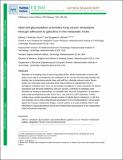| dc.contributor.author | Reticker-Flynn, Nathan E. | |
| dc.contributor.author | Bhatia, Sangeeta N | |
| dc.date.accessioned | 2015-11-10T13:47:44Z | |
| dc.date.available | 2015-11-10T13:47:44Z | |
| dc.date.issued | 2014-11 | |
| dc.date.submitted | 2014-11 | |
| dc.identifier.issn | 2159-8274 | |
| dc.identifier.issn | 2159-8290 | |
| dc.identifier.uri | http://hdl.handle.net/1721.1/99872 | |
| dc.description.abstract | Metastasis is the leading cause of cancer-associated deaths. Although dissemination of tumor cells likely occurs early in tumorigenesis, the constituents of the microenvironment play essential rate-limiting roles in determining whether these cells will form clinically relevant tumors. Recent studies have uncovered many molecular factors that contribute to the establishment of a protumorigenic metastatic niche. Here, we demonstrate that galectin-3, whose expression has clinical associations with advanced malignancy and poor outcome, contributes to metastatic niche formation by binding to carbohydrates on metastatic cells. We show that galectin-3 is expressed early during tumorigenesis by both CD11b[superscript +]Gr-1[superscript + ]and CD11b[superscript +]Ly-6C[superscript hi] leukocytes. Tumors mobilize these myeloid populations through secretion of soluble factors, including IL6. We find that metastatic cancer cells exhibit elevated presentation of the oncofetal galectin-3 carbohydrate ligand, the Thomsen–Friedenreich antigen, on their surfaces as a result of altered C2GnT2 and St6GalNAc4 glycosyltransferase activity that inhibits further glycosylation of this carbohydrate motif and promotes metastasis. | en_US |
| dc.description.sponsorship | National Cancer Institute (U.S.) (Koch Institute Support (Core) Grant P30-CA14051) | en_US |
| dc.description.sponsorship | Ludwig Center for Molecular Oncology (Graduate Fellowship) | en_US |
| dc.description.sponsorship | Stand Up To Cancer (Translational Research Grant SU2C-AACR-DT0309) | en_US |
| dc.description.sponsorship | Howard Hughes Medical Institute | en_US |
| dc.description.sponsorship | David H. Koch Institute for Integrative Cancer Research at MIT (CTC Project) | en_US |
| dc.language.iso | en_US | |
| dc.publisher | American Association for Cancer Research | en_US |
| dc.relation.isversionof | http://dx.doi.org/10.1158/2159-8290.cd-13-0760 | en_US |
| dc.rights | Creative Commons Attribution-Noncommercial-Share Alike | en_US |
| dc.rights.uri | http://creativecommons.org/licenses/by-nc-sa/4.0/ | en_US |
| dc.source | PMC | en_US |
| dc.title | Aberrant Glycosylation Promotes Lung Cancer Metastasis through Adhesion to Galectins in the Metastatic Niche | en_US |
| dc.type | Article | en_US |
| dc.identifier.citation | Reticker-Flynn, N. E., and S. N. Bhatia. “Aberrant Glycosylation Promotes Lung Cancer Metastasis through Adhesion to Galectins in the Metastatic Niche.” Cancer Discovery 5, no. 2 (November 24, 2014): 168–181. | en_US |
| dc.contributor.department | Harvard University--MIT Division of Health Sciences and Technology | en_US |
| dc.contributor.department | Massachusetts Institute of Technology. Department of Electrical Engineering and Computer Science | en_US |
| dc.contributor.department | Koch Institute for Integrative Cancer Research at MIT | en_US |
| dc.contributor.mitauthor | Reticker-Flynn, Nathan E. | en_US |
| dc.contributor.mitauthor | Bhatia, Sangeeta N. | en_US |
| dc.relation.journal | Cancer Discovery | en_US |
| dc.eprint.version | Author's final manuscript | en_US |
| dc.type.uri | http://purl.org/eprint/type/JournalArticle | en_US |
| eprint.status | http://purl.org/eprint/status/PeerReviewed | en_US |
| dspace.orderedauthors | Reticker-Flynn, N. E.; Bhatia, S. N. | en_US |
| dc.identifier.orcid | https://orcid.org/0000-0002-1293-2097 | |
| mit.license | OPEN_ACCESS_POLICY | en_US |
| mit.metadata.status | Complete | |
